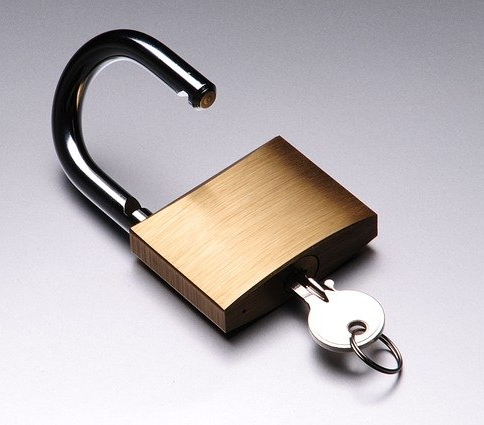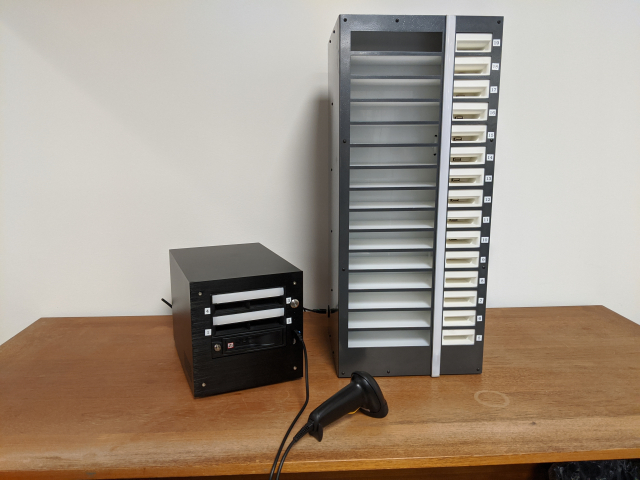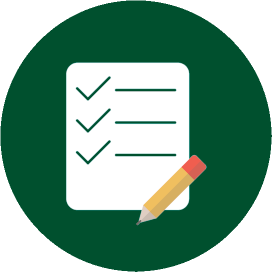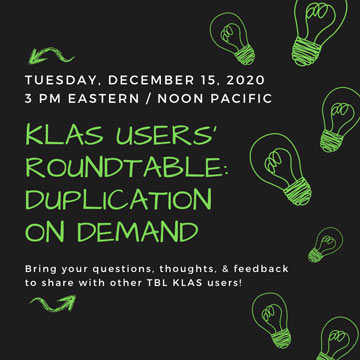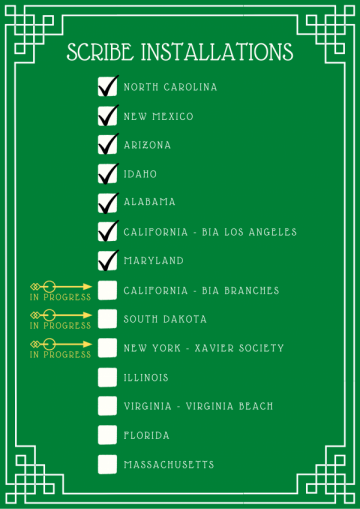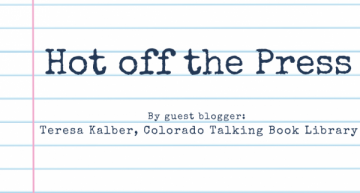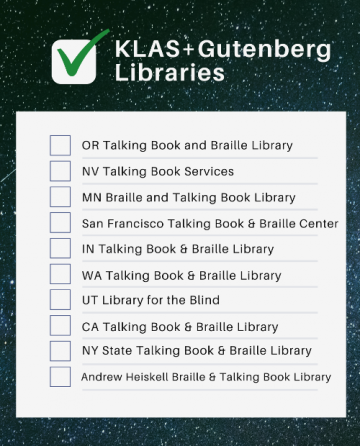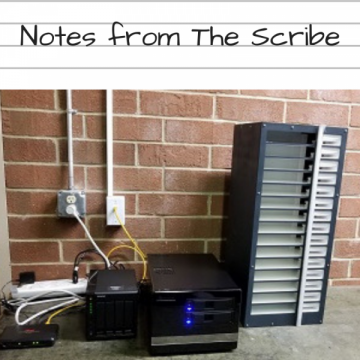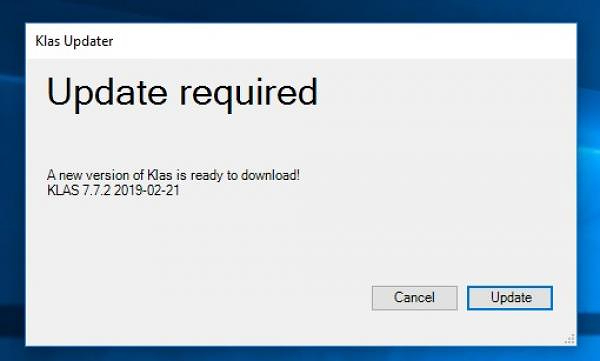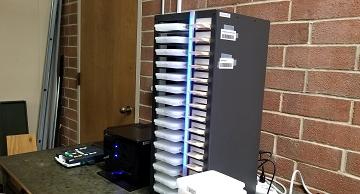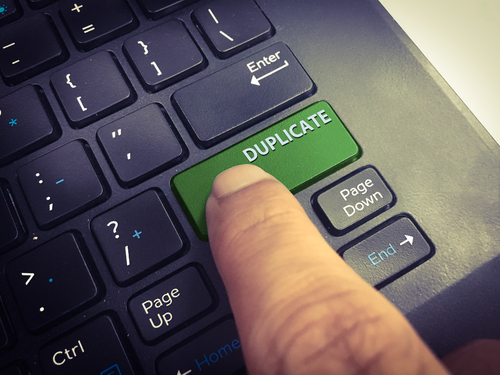Keystone is excited to announce that we've signed an agreement with the National Library Service for the Blind and Print Disabled (NLS) to allow our Scribe Duplication on Demand system to unlock the white, pre-loaded NLS cartridges for repurposing.
Our developers have already begun working on adding this feature to KLAS and expect the initial release of this new functionality to be in the next month.
We plan for the unlock process to be very simple. When you plug a cartridge in to the Scribe to duplicate onto it, the Scribe will check to see if the cartridge needs to be processed. If the cartridge is one the system hasn't seen before, it will process it, ensure we can unlock it, and then follow the NLS guidelines setting the passphrase to be consistent across the network for all repurposed NLS cartridges.
For any cartridges that can't be processed as part of duplication, there will also be a separate mode which allows staff greater control, ensuring all cartridges can be processed and unlocked.
We know this functionality is something our current and future Scribe libraries have been hoping for, and we're thrilled to now be able to bring it to you! Be on the lookout for a Weekly Wrap-up in the near future which will detail exactly which KLAS release includes the capability for Scribe to unlock ALL NLS cartridges.
Please be sure to let customer support know if you have any questions about the timeline or implementation process.
From the desk of James Burts, CEO, Keystone Systems:
Oh, for the good old days of just writing software…..(aka logistics and parts availability for the KLAS Scribe)
*wistful sigh*
It’s times like these I look back longingly when Keystone only wrote software. Like many other companies, supply chain issues (especially motherboard availability) have plagued us recently making the production of Scribes and Scribe mini frustratingly slower than desired.
Months ago, we had a lengthy period where we had problems getting our Scribe tower parts produced, because the design file was corrupted. We got that resolved, and thought we were into clear sailing. Unfortunately, it feels like the world conspired against us, and we are now fighting parts availability issues we don’t have any control over.
The manufacturer of the cases we use for the Scribe Mini shutdown their production facility to re-tool and introduce some new models—one of which we are quite interested in. We stopped being able to receive any of those cases in early December, and now expect to get a shipment in the next week or two.
The motherboards we have to use in the Scribe have become extremely difficult to get our hands on. We have been waiting for several weeks for our most current order, and expect it will take perhaps another month to finally receive them.
The company that made the system we use to control the LED light strips went out of business due to slumping sales in the pandemic. We are working to create a replacement for this component with a much more commonly available Raspberry Pi microcontroller, but we had to write the software to have the Raspberry Pi do the things we need.
The power supplies we use in the Scribe Mini have also been very difficult to purchase.
Things have been improving lately. We expect to receive a shipment of Scribe Mini cases in the next week or so. Our Raspberry Pi version of the light controller looks to be more reliable, and development should be wrapped up on it in the next week or so. We plan to installed it at a beta site or two shortly.
Our biggest issue remains motherboards. We have a number of orders outstanding, and our best hope for anything beyond just one motherboard is looking to be at least a month away.
From my current perspective, I’m really missing the good old days that didn’t include shipping and logistics headaches as we strive to provide a quality product for you. However, we’ll push through this and look forward to getting more Scribes built and put to work for your libraries and patrons as soon as possible.
With the Duplication on Demand KLAS Users' Roundtable occurring this afternoon and the upcoming 2021 KLAS Users' Conference, we feel it's an excellent time to update you on the status of duplication equipment installation at various KLAS libraries. So, let's take a look at which libraries already have their equipment and who is pending for each system.
Scribe Installations and Status
First, we're excited to share that we've resolved the issue that was holding up the production of new Scribes! The solution is in final testing and we expect to resume shipping out Scribe systems very soon. If you are not yet listed below, please contact James Burts () or Keystone's Customer Support Team () to inquire about and / or order your Scribe.
Current Scribe Installations |
||
Library |
Code |
Status |
| North Carolina Library for the Blind & Physically Handicapped | NC1A | Complete |
| New Mexico Library for the Blind and Print Disabled | NM1A | Complete |
| Arizona Talking Book Library | AZ1A | Complete |
| Idaho Talking Book Library | ID1A | Complete |
| Alabama Regional Library for the Blind and Physically Handicapped | AL1A | Complete |
| Braille Institute of America Library Services | CA2A, CA2B, CA2C |
Complete |
| Maryland State Library for the Blind and Print Disabled | MD1A | Complete |
| South Dakota Braille & Talking Book Library | SD1A | Complete |
| Xavier Society for the Blind | Complete | |
| Vermont Department of Libraries, Special Services Unit | VT1A | Complete |
| Miami-Dade Braille & Talking Books Library | FL1C | Complete |
| California State Library - Braille and Talking Book Library | CA1A | In Progress |
| Braille Institute of America - remaining Subregionals | CA2+ | In Progress |
| Florida Braille and Talking Book Libraries | FL1A,+ | In Progress |
| Illinois State Library Talking Book and Braille Services | IL1A | In Progress |
| Perkins Library (Massachusetts) | MA1A | Ordered |
Gutenberg Installations and Status
While the plan to roll out Gutenberg implementations to two NLS network libraries per month beginning in February 2020 was delayed due to COVID, Gutenberg Installations are back underway, so let's take a look at where things stand now. If you have questions about any of the below information and / or if you're interested in getting on the schedule for future KLAS+Gutenberg deployments, contact David Perrotta (, Steve Prine (), and Keystone's Customer Support Team ().
Current Gutenberg Installations |
||
Library |
Code |
Status |
| Colorado Talking Book Library | CO1A | Complete |
| Georgia Library for Accessible Statewide Services | GA1A | Complete |
| Oregon Talking Book and Braille Library | OR1A | Complete |
| Nevada Talking Book Services | NV1A | Complete |
| Minnesota Braille and Talking Book Library | MN1A | Complete |
| San Francisco Public Library - Talking Books and Braille Center | CA1C | Complete |
| Indiana State Library - Talking Book and Braille Library | IN1A | Complete |
| Washington Talking Book & Braille Library | WA1A | Complete |
| Utah Library for the Blind | UT1A | Complete |
| New York State Talking Book and Braille Library | NY2A | Complete |
| New York Public Library - Andrew Heiskell Braille and Talking Book Library | NY1A | Complete |
| Wolfner Talking Book & Braille Library | MO1A | Complete |
| South Carolina State Library - Talking Book Services | SC1A | Complete |
| Oklahoma Library for the Blind and Physically Handicapped | OK1A | Complete |
| Wisconsin Talking Book and Braille Library | WI1A | In Progress |
| Delaware Library Access Services | DE1A | Up Next |
| Ohio Library for the Blind & Physically Disabled | OH1A | |
We just released a new feature to help Duplication-on-Demand libraries keep their catalogs up to date!
From the 7.7.50 Release List:
You can now choose to have titles automatically updated to an Active status when you add an eDoc, just as you can have titles make themselves Active when you add the first physical item.
But let’s talk a little bit more about what this can do, and who will want to use it.
We expect this will be primarily for libraries using Duplication on Demand, and especially the ones who are (or will soon) be going collectionless. If you don’t have physical copies of anything or have very few physical copies, it only makes sense to make everything you can duplicate “Active.”
Even if you still have a physical collection, if most of your patrons are getting DoD will they be confused that some titles are listed as Active and some are Download Only? Once you zero out your copy allotment, do you want new titles to linger in “In Process” status long after you start duplicating them for patrons?
If any of the above has you thinking, “yes, I want to use this feature!” here’s what to think about...
- What title statuses should update when they get an eDoc?
- What status should they update to?
- What about the back catalog?
What title statuses should update when they get an eDoc?
Open up the catalog and look at the list of Title Statuses. Are there ones that shouldn’t be over-written, like Withdrawn? If there are titles you purposefully removed from your collection (Ex: outdated medical information or obsolete guides to the internet) we don’t want to accidentally resurrect them.
If you have a Special Order Only or similar status, do you want to keep those titles segregated? Or if you’re duplicating at full steam, are you ready to fold the ones you can duplicate back into Active?
When you’re ready, send us the list of statuses that should be updated by this feature.
What status should they update to?
I mostly talked about the feature updating duplication-ready titles to Active, but that isn’t your only option. Any status other than Withdrawn can be duplicated, so it won’t cause problems if you do want to keep these titles under a different status. You could do an “Active – Duplication” or “Active for Digital” title status. Or, you can put them under “Download Only” if you have that labeled clearly for your OPAC (something like “Available for Download or Books on Demand”). And, of course, if you’re changing things to Download Only, that shouldn’t also be in your list of statuses to be updated.
Figure out what makes the most sense for your collection and your patrons, and tell us what status titles getting their first eDoc should update to. You can also let us know if you want to set up a new title status or re-label any of the existing ones on your OPAC.
What about the back catalog?
Once you’ve set both your statuses to be updated and the status to update them to, those rules will automatically apply whenever a title gets its first eDoc. But what about any titles that already have an eDoc but are lingering in a no-longer-accurate status?
We have a program we can run through your batch manager to clean those up! We’ll want to run it sometime when you aren’t doing anything in the catalog module, to avoid any conflicting record locks. Most likely, we’ll run it overnight or early in the morning before you get to work.
Just bear in mind that it can be messy to try to undo this kind of thing, so do your best to be sure about the changes you are making before telling us to run the cleanup.
The Duplication Service model opens up a ton of new possibilities for serving patrons, and with that comes a whole host of new edge-cases, problems, opportunities, and workflow questions. Today, let’s look into one of those new workflow questions: what do you do when a Title is Withdrawn?
First up, what exactly do I mean by “Withdrawn? For this post, I’m referring to Titles NLS has recalled due to Quality Control or other concerns as well as Titles with a status of “W / Withdrawn” in the KLAS Catalog. Most points will be the same or pretty close for NLS recalls, Locally Produced titles you have withdrawn for quality or timeliness (such as a corrupted file or a voting guide from a previous election), or for NLS titles you have decided to no longer offer (such as computer “how-to” guides from the early 90s).
What happens in KLAS?
For Gutenberg libraries, when NLS recalls a title the file is pulled from the Gutenberg hardware. Overnight the e-Doc sync in KLAS will spot the missing file and report the e-Doc as “stale” in the PCC Load Summary. (If you want to keep an eye on your e-Doc sync and do not yet get a daily PCC Load Summary email, let us know!) The title can still be added to patron Service Queues or included in a Duplication Order—however, it cannot be duplicated, because Gutenberg no longer has the file! So when NLS notifies you that a title is being recalled, it’s important to go into your KLAS Catalog and either make the title status Withdrawn or delete the e-Doc. That will prevent KLAS from letting the title onto any Dup Orders.
For titles you chose to withdraw on your own, you can proceed as below.
For Scribe libraries (or Gutenberg libraries doing a voluntary recall), you have more choice about how to proceed. The file is not automatically pulled so, as long as you leave the record in an active status, you can continue to duplicate the title as you decide how to proceed. When you are ready to stop all duplication, you should update the catalog record to make the title status W / Withdrawn. At that point the title may still be on some patron’s Service Queues, but it can no longer be added to any new ones or included in a Duplication Order. The Sanitize Queue function then removes the title from patron Service Queues during its next routine sweep.
So, what are your options?
You can always immediately shut down duplication of a title by changing the title status to W / Withdrawn. However, if you want a little wiggle room, you do have other options.
For a voluntary recall (or if using Scribe) you may leave a sub-par but functional title active, add the No Autoselect (NAS) subject heading to the record, and include a cautionary note in the title field. This is a good option for reissued titles you want to provide to patrons with a strong Narrator preference, but don’t otherwise want to send. This won’t fully withdraw the title, but will keep it from being sent by Subject preference, and guide Reader Advisors to which version of the title they should send.
You may also use the NAS option as a stop-gap for titles in the process of being re-recorded. For example, NLS recently pulled A DB 100980, Time for Mercy by John Grisham, in favor of replacing it with the unabridged version. If you want to offer your patrons the option of getting the Abridged version instead of waiting for the replacement (and if you have a Scribe, since the file was pulled from Gutenbergs automatically), you can add NAS to the Local Subjects, and add “Abridged version” to the title.
However, you probably also want to either pull it from patron’s Service Queues where it’s been auto-selected, and/or contact patrons to see if they want to wait for the Unabridged version.
Patrons with Queued Title Report
This is where a brand-new report comes in: Patrons with Queued Title. This report (which will be included in KLAS v7.7.47, our next update), will fetch a list of every patron with a particular title on their Service Queue and/or in a Duplication Order.
Use this report to remove the withdrawn title from queues where it was automatically selected, then reach out to patrons who requested it ask if they want the current version, or want to wait for a re-record.
Or, when browsing the report results, you might find few to no patrons actually requested the title, and decide to update the title status to fully Withdraw it right away.
Always feel free to ask!
Whew... this was a long one. I hope it helps you understand how Withdrawn titles affect Duplication Service, what happens automatically in KLAS, and your options for handling them. However, feel free to ask us any time a situation like this comes up, and you aren’t quite sure what will happen or how to proceed. After all, this is still a relatively new approach to patron service! We’re here to share the technical details and help you determine your best course of action.
And, of course, we hope the new report comes in handy!
"Duplication" is the word of the day / week / month / year for National Library Service for the Blind and Print Disabled network libraries. Whether you've already made the fundamental shift to providing duplication on demand materials for your patrons or are still trying to make decisions about how to shift your library to a duplication on demand service model, there's many questions, decisions, and challenges faced during the process.
With this in mind, the KLAS Users' Group Program Committee is providing another opportunity for KLAS Users' to come together in a session focused on this topic. Go ahead and mark your calendar now for the upcoming KLAS Users' Roundtable: Duplication on Demand to be held on Tuesday, December 15 at 3 PM Eastern / Noon Pacific.
Note: We expect this session to last two hours rather than the usual one. Also, we plan to record this roundtable and post it to klasusers.com for later reference.
During this roundtable, three representatives of libraries using Gutenberg and three representatives of libraries using Scribe will each discuss their experience implementing duplication equipment, decisions regarding policy and staff changes, and more! After each shares a brief description of their process, there will be an opportunity to ask questions, discuss issues they've brought up, etc.
Gutenberg Panellists:
- Hope Williams, Nevada Talking Book Services
- Elke Bruton, Oregon Talking Book & Braille Library
- Ricardo Cisneros, San Francsico Public Library - Talking Book and Braille Center
Scribe Panellists:
- Connie Sullivan, South Dakota Braille & Talking Book Library
- Angela Fisher Hall, Alabama Regional Library for the Blind and Physically Handicapped
- Nancy Holt, Idaho Talking Book Library
Before the roundtable...
To help you prepare for this roundtable we encourage you to review Duplication Info Quick Reference page where you will find articles, quick tips, how-to documents, and more related to using either Gutenberg or Scribe. Several of the documents have just been updated to reflect changes in recent versions of KLAS, so make sure to check those dates to make sure you have the most current info!
You can also help our panellists prepare for this session by posting questions to this KLASUsers Discussion Forum post. Of course, day-of questions are also welcome, but posting your questions ahead of time will ensure that we get to them (even if you can't make the session itself) and that the panellists will be able to consider their answers.
Access Info:
Tuesday, 12/15/2020 @ 3pm Eastern Time / Noon Pacific
To connect:
Google Meet Link: meet.google.com/rmv-fgvs-eba
Dial-in audio option:
US +1 575-459-0037
PIN: 950 920 249#
Locally Produced Titles
ExpiredWhile NLS provides the majority of the Talking Books collection, many libraries supplement this with locally recorded books and magazines. You've put a lot of time and resources into these titles, so of course you want to make sure these can get to your patrons, or even to share them with the other network libraries! But, as with everything else, the new Duplication service model and January's major server failure posed some disruptions to this. Let's take a look at where everything stands now, and where we're heading.
Read on for:
- DBCs available on BARD
- SHELF Titles
- Other Local Titles (Including Serials!)
Hopefully this will help answer your questions about making Locally Produced Titles available to your patrons and to the network!
DBCs available on BARD -
Locally produced books that have been through NLS' process and are avaible on BARD are fully supported for Duplication on Demand with any hardware setup (Gutenberg, Scribe, or traditional PCC). All you need are the BibRecs--any local storage using R-sync or any Duplication hardware can receive the files via NLS, and KLAS' automatic eDoc generation will make sure that aspect is in place. If you do not yet include DBCs in your regular MARC loads, and are moving to duplication soon, contact Customer Support to get them added in!
SHELF Titles -
The SHELF Project was created to support the sharing of locally produced titles before NLS provided the option to submit them to BARD, and is still in use. Libraries may chose to share titles via SHELF if they do not meet all of NLS' criteria, or if they have not yet been submitted (such as when a library has a large back-log of local titles). Additionally, SHELF supports serial titles such as magazines.
Unfortunately, SHELF was hit hard by the loss of our SAN server and back-up. Nothing was lost and support for downloading the existing Shelf Titles is still in place! However, the ability to upload new files to our new server is still a work in progress.
As part of this work, the database used to host SHELF has been upgraded from KLAS 7.5 to 7.7--requiring all of the SHELF-specific functionalities to be imported to the 7.7 baseline. While doing this, our developers are actively working on some long wait-listed improvements.
The ability to upload new titles to this new SHELF database and for SHELF to then distribute the MARC records and eDocs for those titles to the other SHELF libraries is still in process, but we expect it to be finished soon. When these are available again, they should be easier and better than ever! Here's how we expect it to work:
- File uploads will still use an FTP client, now directed to books.klas.com (just like other local titles for Scribe).
- The SHELF database will create BibRecs using the originating Library ID and original KLAS ID (E.g. UCSC-VDB0002). The originating Library ID, original KLAS ID, and SHLEF's new KLAS ID are kept in the 901 tag which gets propagated out to libraries.
Serial titles will actually use serial records, rather than kludged monograph records. - The BibRec Import/Export procedure is simplified to be more purely based on the MARC. There is no separate XML structure passed around for BibRec information or eDoc information.
- Edocs in the recieving libraries are created using the 856 tag information in the MARC data, making the titles downloadable over the WebOPAC.
Finally, once all of this is in place, SHELF titles will be fully supported for duplication via Scribe! Duplication will also be possible on Gutenberg or traditional PCC, but you may need to follow the procedures in the next section to make the files available to your duplication hardware and to generate eDocs that are valid for that system.
Again, all of this is still in the works, but watch the Release Lists and the Friday Wrap-up emails because it should be coming soon. I will also be making more specific how-to information available when the workflows are finalized and available.
Other Local Titles -
To Duplicate any title, you need three pieces: a BibRec, a file, and an eDoc that connects the two. To Duplicate local titles that are not availble on BARD, you will need to make the file available to your duplication hardware another way.
For Scribe: You may use your own local storage device (as with traditional PCC), but the Scribe Mini has it's own internal storage which makes this unnecessary. To add local tiles to your Scribe unit(s), you can upload the files to the centralized storage depository (books.klas.com) using any FTP Client. Shelf Titles will automatically be available, no extra upload needed. Serials are also fully supported!
In the future, we hope to support uploading local titles through KLAS itself rather than needing an FTP Client, but in the meantime, follow these instructions to upload local Titles to your Scribe:
- QuickTip - Upload Local Titles (Scribe)
For Gutenberg: It is also possible to duplicate local titles on Gutenberg, but please contact NLS for instructions on uploading the files. Support for local Serials on Gutenberg is in-process--we are just waiting on some assistance from NLS for final testing.
- QuickTip - Upload Local Titles (Gutenberg)
For Traditional PCC: Because traditional PCC setups use a variety of storage solutions, it is hard to provide general instructions. However, most solutions allow you to connect to your local storage and add files via the network. Serials should work with traditional PCC. However, bear in mind that all local issues would need to be re-uploaded on a Scribe or Gutenberg once you transition. As such, we recommend you wait for SHELF to be available or for your choice of duplication hardware to arrive.
For Any: With any of these systems, once the files are in the right location and you have a matching BibRec, KLAS will create the eDocs overnight. Full instructions for using local Serials with duplication (currently available for Scribe and PCC, available soon for Gutenberg) are available:
- HowTo - Local Serials (Scribe)
- HowTo - Local Serials (Gutenberg)
Since we shared the planned KLAS+Gutenberg implementation timeline, we've received some requests for an updated list of KLAS libraries now running Scribe, in the process getting a Scribe, or expressing interest in a Scribe.
As of today, we've built and installed Scribes at seven KLAS libraries, have three libraries in progress, and at least four more in line who have formally committed or expressed a strong interest in Scribe.
The limiting factors for getting a Scribe to a library are how quickly we can build it, getting the library migrated to KLAS 7.7, and making sure the equipment is approved for use by parent organizations.
| Library | Install Status |
| North Carolina Library for the Blind and Physically Handicapped | Complete |
| New Mexico Library for the Blind and Physically Handicapped | Complete |
| Arizona Talking Book Library | Complete |
| Idaho Talking Book Library | Complete |
| Alabama Regional Library for the Blind and Physically Handicapped | Complete |
| Braille Institute Library Services - Los Angeles | Complete |
| Maryland State Library for the Blind and Physically Handicapped | Complete |
| Braille Institute Library Services - Branches | In Progress |
| South Dakota Braille & Talking Book Library | In Progress |
| Xavier Society for the Blind (New York) | In Progress |
| Illinois State Library Talking Book and Braille Service | Not Yet Scheduled |
| Virginia Beach Bayside Special Services Library - Braille and Talking Books | Not Yet Scheduled |
| Florida Braille and Talking Book Libraries | Not Yet Scheduled |
| Perkins Library (Massachusetts) | Not Yet Scheduled |
If you have any additional questions about Scribe delivery timelines or want to get your library on the list (or back on the list for an additional purchased Scribe Mini), contact Keystone Customer Support at . For Scribe Specs and Pricing information, please see our Duplication Information page.
Finally, keep an eye out: the Users' Group Programming Committee is currently organizing a Duplication on Demand Roundtable webinar featuring voices from both Gutenberg- and Scribe- libraries!
Hot off the Press: Part 5
Expired"Hot off the Press" is blog series from guest blogger, Teresa Kalber. Teresa is the Network Systems Administrator at Colorado Talking Book Library. In this series, she shares her library's experience being one of the first two KLAS libraries to implement NLS' Gutenberg equipment.
The first four posts in the series are here:
- Hot off the Press: Part 1
- Hot off the Press: Part 2
- Hot off the Press: Part 3
- Hot off the Press: Part 4
Hot off the Press: Part 5, Problems and ongoing issues
Here is a recap of some of the issues we have/are experiencing with Gutenberg.
Service Queue/Order issues:
- With DoD, patrons now have to the entire collection on BARD. Because of this they are getting books in subjects they may not have been before and also getting a lot of the newer books. We get a lot of RA calls for patrons saying I would never order books like this. The RAs go through their subjects and work with them on getting them the type of books they like. This has brought up the issue that there is no easy way to empty the service queue. Each item must be deleted one at a time. If all the items are deleted out of the queue, KLAS hangs up and usually needs to be restarted.
- Because of the issue above, we are still in flux as to the default number of books we want in the service queue and where the refill point should be. This has also been problematic for us as it results in cartridges going out with less than the 10 we have them set for.
- When RAs are trying to create an order for a patron, it takes our system over 5 minutes to open the “Create Dup Order From Queue” screen. This makes it difficult to create orders for patrons when also taking phone calls because of the time involved. Many times they will have to make a note and go back and create the patron’s order later.
- Cartridges will go out for our on-demand patrons, so we need to have their NS Cutoff set to 0 to prevent that from happening.
- Local Recordings:
- We have been working with both NLS and Keystone to figure out how to get our locally recorded books that are not on BARD to work with Gutenberg. We think we have come up with a solution, but it will take some time to implement.
- Keystone is also working on having functionality for Serials in place for Gutenberg so that we can put our local newsletter on the duplications cartridges.
Cartridge Errors:
- When the service queue is filled, it will select books from our local recordings for patrons. Because we had not solved the problem with our local books, this would cause the cartridge have an “error” status. There is currently not a way to run reports or queries in KLAS to find these errors and make sure those patrons are getting service.
- Also for cartridges that are in error status – the books on the cartridge are not added as a has-had to the patrons record since the cartridge never got checked out. But since the cartridge is on the orders tab, those books are not eligible for selection. There is currently no easy way to get those books back on the service queue.
Gutenberg Hubs:
- Sometimes a cartridge is scanned and the internal and external barcode have not been linked. There is a way to configure a port on the Gutenberg machine to plug in a cartridge and have that connection made. NLS is now sending out the machines with this port already configured. Ours was not sent that way and I had to create the port myself. Once I configured the port, Gutenberg stopped recognizing the first hub in the toaster rack attached to that computer. I don’t know if the two events were related since we have ongoing issues with Gutenberg not recognizing hubs at various times. We are working with NLS on this. It’s a fairly simple fix, but it is an issue.
- Offender (Inmate) Accounts:
- We handle our offender mail separately from our other patrons’ mail. Because of this, we have not converted our offenders to duplication service since we don’t currently have a way to run their cartridge orders separately from the rest of the orders.
- Cartridge issues:
- We ordered a supply of cartridges from Perkins to help with the problem of large orders being created. The Perkins cartridges do not have external barcodes on them. We had to work with NLS to figure out a way to be able to use these cartridges with Gutenberg. Since we placed the order, KLAS put a fix in place to prevent orders larger than 4GB to be sent to Gutenberg for copying.
- We also ran into problems trying to repurpose the green cartridges we purchased to use. NLS had to make a setting change in Gutenberg for us to be able to use these cartridges with the system. However, we have to go into another computer, plug in the cartridges and unlock them with the DTB Protect software before we can use them with Gutenberg.
I hope you enjoyed my posts on our conversion experience. Both Debbi and I have documents we kept during the process that we would be happy to share. I’ve also started a post in the discussion forum if you have questions or would like me to cover something not included in these posts.
Hot off the Press: Part 4
Expired"Hot off the Press" is blog series from guest blogger, Teresa Kalber. Teresa is the Network Systems Administrator at Colorado Talking Book Library. In this series, she shares her library's experience being one of the first two KLAS libraries to implement NLS' Gutenberg equipment.
The first three posts in the series are here:
Hot off the Press: Part 4, Converting existing patrons
On November 4th, we began the process of converting our existing patrons over to the duplication model. We decided to go with our high-demand patrons (we have a separate patron type for high-demand) first, followed by students. Then we worked on converting the remainder of our patrons based on the number of books they were receiving. We initially set patrons up to get 1 cartridge with 10 books on it.
The first day I converted 100 patrons over. However, I realized that in order to complete the conversion by the end of the year, we would need to convert more than that each day. After discussing this with our mailroom supervisor, it was decided to convert 200 patrons each day.
As I ran queries in KLAS to find the patrons I needed to convert, I created Excel spreadsheets with lists of 200 patron ID’s and saved them as text files with the date I was converting them to DoD. Then I could pull the query into KLAS and use the Batch Update Profile tool to convert all 200 patrons at one time. Then I would scroll through the records to verify everything looked like it should.
One of the problems we had early on was duplication orders being sent to patrons that had a block on their account. As I was scrolling through the patrons, I would find those patrons and make their digital book service inactive so no cartridges would go out. Once the problem was fixed in KLAS, I changed all these patrons back to active for digital books, so those that had an automated date to restart service would get a cartridge.
One week after a patron was converted to DoD, I would to run the same query again and bump their number of cartridges up to 2, and after another week, set them to our max of 3 cartridges. We gradually increased their number so they didn’t get all 3 cartridges at once and also to try and not overwhelm mailroom staff.
Most days, we were getting around 250 orders. We figured once our conversion was done, we would get somewhere between 300-400 cartridges per day. In order to try and meet those numbers and see how it would affect mailroom staff, I upped the number of patrons being converted to DoD to 300 per day.
Around mid-November, we noticed that KLAS and Gutenberg didn’t appear to by syncing again. Orders we created in the morning we not being sent to the Gutenberg machines. We were unable to serve walk-in patrons because their orders wouldn’t go through. After looking into the problem, we discovered that the batch manager was being overwhelmed with creating service queues for the patrons I had converted that morning. After figuring out this was the problem, I didn’t do conversions until after 3:30 in the afternoon. John C. at Keystone also mentioned putting something in place on KLAS so the service queue would function more efficiently (not sure if this was done or not).
Around the same time, NLS had problems with one of their servers, and our duplication order didn’t run in the morning. Because I had converted patrons in the morning, our order didn’t start copying until 3:30 in the afternoon. That caused us to have almost 1000 cartridges the next day. I guess it was a good test for how much duplication we can get done in a day.
With this large order, we realized the copying process went fairly quickly and we could easily make this many cartridges each day. However, printing the mailing cards took most of the day. So we decided to invest in a 2nd printer to alleviate the bottleneck at the printer.
On 12/3, I converted the remainder of our individual patrons to duplication and also the 200 organization accounts we had on automated digital book service. This resulted in our largest duplication order of 1,015 cartridges, although I’m not sure why. Once this conversion was done, I spent the next 2 weeks moving all the patrons up to 3 cartridges each. The process was completely done by 12/11/19, which worked out great since we needed to be closed the week on 12/16 due to a building maintenance issue.
Statistics for 11/4/2019 – 12/31/2019:
- 15,721 cartridges sent out
- 3,790 cartridges returned
- 4,711 patrons received duplication cartridges
Up next: Problems and ongoing issues
Hot off the Press: Part 3
Expired"Hot off the Press" is blog series from guest blogger, Teresa Kalber. Teresa is the Network Systems Administrator at Colorado Talking Book Library. In this series, she will be shares her library's experience being one of the first two KLAS libraries to implement NLS' Gutenberg equipment.
The first two posts in the series are here:
Hot off the Press: Part 3, The Pilot
We received our equipment on a Friday and got everything working on the following Monday. Even though we had the system working on Sept. 23rd, we didn’t do any testing until I returned to the office on Sept. 30th.
When the Gutenberg system is first installed, it is operating in “sandbox” mode and is connected to the preview database for KLAS. We tried to push through a few orders for staff from the preview database, but they weren’t being copied onto cartridges. It was finally determined that KLAS and Gutenberg weren’t syncing with each other so the orders weren’t getting processed. Once Keystone restarted the syncing process, the orders came through. So on Oct. 2nd, we switched from sandbox to production mode so we could really test the system by starting the pilot.
We began the pilot with 50 existing patrons. For the existing patrons, we decided we would send out 2 cartridges with 3 books on them so we could get them back during the month long pilot and test the return part of the system too. We also made the decision to not send books out to new patrons about a week before we started the pilot. So since the end of September, all the new patrons have been put on the duplication model. New patrons were set-up to receive 3 cartridges with 10 books each on them.
On Oct. 3rd, we sent out our first 76 DoD cartridges! Yay!
The most consistent problem we noticed in the first few weeks of running Gutenberg was that daily KLAS and Gutenberg would stop syncing and we’d have to contact Keystone to restart the process. Because the problem was so consistent they wrote a temporary fix to automatically restart the service each morning to try to help with the process. Within 2 weeks of starting the pilot the problem has been solved and a fix applied during an update of KLAS.
We also had problems with serving walk-in patrons due to the time it would take to process an order. At first, Keystone and Gutenberg were only syncing every 15 minutes. So we would place an order and potentially have to wait up to 15 minutes to see if the order synced or not. If it didn’t sync and we needed to contact Keystone to restart the service, another 15 minutes would pass. Many times we would just pull individual books from the shelves and check them out using front desk since we are unable to assign books to a duplication patron. However, I believe the sync times have been cut down and we don’t usually have problems serving walk-ins now. An order for a walk-in patron, will be sent fairly quickly, even if we are still in the midst of making cartridges for the day. So mail room staff have to check mail cards as they scan each completed cartridge to look for the walk-in patron’s order.
A big learning curve came in how to best figure out how to set the nightly settings for DoD, since it works a little differently than it did before. When I would call Nancy, she would tell me “theoretically” it should work this way. I had to just make adjustments and then see what happened afterwards. Luckily our pilot patrons were very understanding during the process.
Other minor problem we encountered (that have all been fixed now):
- Service queue was adding all the books in a series, even if the patron had already had them before.
- Service queue was adding oldest books from request list, when we had the system set to add the newest books first.
- KLAS would allow orders larger than 4GB, which would then sit on Gutenberg since we didn’t have a cartridge big enough to copy the order
- Duplication orders were still being processed for patrons with a block on their account.
On Oct. 22nd, we participated in a conference with NLS, Keystone and Georgia to discuss how we felt things were going with our pilots. Both of us agreed that there were some minor problems, but nothing to prevent us from moving forward with beginning to convert the rest of our patrons over to DoD. We decided to start the conversion process at the beginning of November with the goal of being completely done with the conversion by the end of the year.
Statistics for our pilot (10/3 – 11/1):
- 644 cartridges sent out
- 192 patrons on DoD
- 91 cartridges returned
Up next: Converting existing patrons
Hot off the Press: Part 1
ExpiredWelcome to the "Hot off the Press" blog series from guest blogger, Teresa Kalber. Teresa is the Network Systems Administrator at Colorado Talking Book Library. In this series, she will be sharing her library's experience being one of the first two KLAS libraries to implement NLS' Gutenberg equipment.
Hot off the Press: Part 1
A little delayed, but as promised we are sharing our experience of converting over to Gutenberg duplication as our main circulation method. This first installment will cover our pre-planning steps.
Our Director has been excited about using duplication on demand since she first heard about it. Knowing this and also knowing our KLAS server was reaching end of life and would not support KLAS 7.7, I began conversations with both our IT department and Keystone as early as December 2018 with a plan to have our server replaced by June 2019. I also started discussions with our security officer and our network administrator about DoD to ensure we would be able to use the equipment on our network without issues.
In May 2019, we found out we had been chosen to be the self-hosted pilot site for Gutenberg integration with KLAS. Our IT department had set-up a new virtual server for me and agreed to allow Keystone to submit an image to be placed on the server to run KLAS. Their caveat was that they would not provide support since the software didn’t conform to standards. Since they have never provided support for our servers anyway, I didn’t see this as a problem.
Things we needed to think about between finding out about the pilot and getting the Gutenberg equipment in September:
- Placing an order for additional mail cards beyond what NLS provides
- Preparing cartridges and containers to use for DoD
- Placing labels on unused cartridges and containers
- Stripping labels from used cartridges and containers and replacing with new labels
- Notification of patrons – we did a blurb in our newsletter and that was our only notification to patrons.
- Selecting patrons for the pilot (if you do one)
- When to start new patrons on DoD (we started new patrons when we started the pilot)
- When to zero out copy allotment so no new books come
- How to cut-over patrons once the pilot is complete
- Initial default number of books on a cartridge and default number of cartridges (We used 10 books/3 cartridges per patron as our default)
Both NLS and Keystone have documents of things to consider during planning stages. NLS also has a great overview of the necessary IT requirements. Once I received this document, I forwarded it to our Security Officer and Network Administrator to ensure there would be no problems in using the Gutenberg equipment on our network. I think opening these lines of communication early helped the process go more smoothly.
We were finally able to convert to KLAS 7.7 on August 19, 2019. This gave us about a month to iron out any issues before receiving our equipment from NLS on September 20th.
Next 10 KLAS+Gutenberg Libraries
ExpiredKeystone Systems and the National Library Service for the Blind and Print Disabled (NLS) are excited to announce that following highly successful test implementations at Colorado Talking Book Library and the Georgia Library for Accessible Statewide Services they plan to start rolling out KLAS+Gutenberg implementations to two NLS network libraries per month, beginning in February.
The next 10 KLAS+Gutenberg libraries and their install months are as follows:
Library |
Installation Date |
| Oregon Talking Book and Braille Library | February |
| Nevada Talking Book Services | February |
| Minnesota Braille and Talking Book Library | March |
| San Francisco Public Library - Talking Books and Braille Center | March |
| Indiana State Library - Talking Book and Braille Library | April |
| Washington Talking Book & Braille Library | April |
| Utah Library for the Blind | May |
| California State Library - Braille and Talking Book Library | May |
| New York State Talking Book and Braille Library | June |
| New York Public Library - Andrew Heiskell Braille and Talking Book Library | June |
KLAS+Gutenberg Installation Criteria & Prioritization
Keystone collaborated with NLS to select this list and determine the order of the rollout based on the following criteria:
- Libraries need to have completed an upgrade to KLAS version 7.7, or at least be well along in the upgrade process.
- Libraries must have adequate onsite IT support.
- Libraries must have expressed interest and enthusiasm for moving forward with KLAS+Gutenberg, with preference given to those libraries that submitted their requests the earliest.
Both Keystone and NLS look forward to continuing the duplication on demand rollout. We’ve already received requests from a number of libraries in addition to the initial group of 10. KLAS libraries with questions about any of the above information and / or interested in getting on the schedule for future KLAS+Gutenberg deployments should contact David Perrotta ()This email address is being protected from spambots. You need JavaScript enabled to view it."> and Steve Prine ()This email address is being protected from spambots. You need JavaScript enabled to view it..">.
Information Round-up
ExpiredWe’ve got some new information up for you this week! Let’s have a look...
1. Release Lists
As the v7.7 rollout continues, 7.7 itself has been under continuous improvement. I’ve just posted the most recent build, 7.7.14 (along with 12 and 13, which were very small builds targeted to fixing a few localized but important issues) to the 7.7 Release Lists page.
The new build has some great quality-of-life improvements, including some new options for your patron queries! For example, you can now query against patron subscriptions (including SER-DDB9 to find patrons with a BARD registration) and whether a patron is set up for Duplication service. A QuickRef with a list of all the new fields you can query against is also available on the Release Lists page. There are improvements for our IRC and other customers as well, so no worries--it's not all LBPH stuff.
2. Duplication Info
I’ve been sharing a lot of information about Duplication on this blog, to keep you all informed and up-to-date. But we know it can be a pain to have to go back and find something weeks or months later; especially if you aren’t sure if it was here, on the discussion forums, or somewhere else.
To address this, we’ve created a one-stop-shop for Duplication Info. You can access this page from the Main Menu, under Documents – Quick Reference (and it’s a static URL, so feel free to bookmark it if that works better for you).
From now on, all information having to do with Duplication that is posted to KLASusers will be added to the Info page to keep it easily accessible. I have a lot more planned for you (and would love to hear what you need most!) so I hope this Info page will be helpful for keeping it all organized.
3. Scribe Specs info sheet
A new document is available on the Duplication Info page--one that I think plenty of you will be interested in!
The Scribe Specs & Cost document briefly lays out all the specifics of the Scribe system. It covers what is included with a Scribe, the details for each component of the system, and how much it costs all in a streamlined front-and-back info sheet, perfect for your IT folks or funding agencies. Head over to the Info page to give it a download!
Duplication Supplies
ExpiredInterested in moving to a Duplication on Demand service model, but not sure how you’ll get enough cartridges and other supplies? There’s help available! NLS is offering supplies to all network libraries that are willing to transition to zero copy allotment--whether they plan to implement Gutenberg or Scribe.
Many of you have already heard about this and some have already put in their request, but please read on anyway—we’ve worked with NLS to make sure we’re accurately covering all the important details.
On top of that, we’ve developed a worksheet to help you plan your implementation process, including when you will need additional supplies.
Just the Facts
When you are ready, you can order from NLS:
- Up to half of your total need for cartridges and containers.
(Total need is calculated based on 5 cartridges per active audio patron, so half works out to 2.5 cartridges and cases per active patron.)
- Pre-printed cartridge and container labels with your library information
In return, you will need to work towards full duplication service. NLS expects libraries to zero out their copy allotment within 12 months of implementing duplication on demand.
Good Stuff to Know
Be aware that your supplies will arrive in one shipment on pallets. This is intended to be a lifetime supply, so please be prepared for a large shipment proportional to your patron base.
The cartridges will have the standard “white cartridge” passphrase, and will need to be reset to the peach passphrase using the NLS device, or using the Repurpose mode of the Gutenberg.
NLS encourages libraries to repurpose cartridges and containers from their existing collections to make up the other half of their need, and they can loan Scribe libraries a stand-alone device that will unlock white cartridges for re-use. The cartridge is then re-locked with the peach passphrase, so it will continue to be protected. (Check out our Thursday Tip on High-Capacity Cartridges for the trick to easily identify the best cartridges to keep for duplication.)
Timelines
NLS can only get so many supplies ordered and distributed per month. Currently, they are asking for two month’s lead time.
Being clear about your timeline and need will help NLS prioritize orders, as will holding off on requesting supplies if they will not be needed soon. NLS will also ask Keystone to confirm that we have an “authorized commitment” to proceed and a clear implementation schedule in place, so please coordinate with us before you make your request for duplication supplies to NLS.
To help you estimate when supplies will be needed, and in what amounts, we have developed the attached worksheet. Take advantage of our experience with several implementations, and have a look! Of course, we know you may still have questions or need more help making your estimates, so don’t hesitate to get in touch with us for assistance.
Worksheet
The attached questionnaire is intended to help guide you through planning your implementation of a Duplication service model using Scribe or Gutenberg, including generating estimates of supplies needed for the initial stages, specific goals, and action items.
It will be most useful before contacting NLS to order supplies.
- Duplication Questionnaire - Word
- Duplication Questionnaire - PDF
As more Talking Book libraries are considering which Duplication on Demand equipment and workflow to implement, we're working to help you make an informed choice about what will work best for your library, your staff, and your patrons. That means more resources and more opportunities to ask questions and get in-depth answers.
Two specific things we're working on are:
- Scribe Cartridge Recycling video
- Duplication on Demand Q&A webinar
Scribe Cartridge Recycling Video
For the past month or so, Katy and I have been working to create a video demonstrating the Cartridge Recycling workflow for Scribe. In the video, we show and describe using Scribe to duplicate cartridges that are not tied to a specific patron. It is in the final editing stages and should be ready for prime time in the next week or so. Until then, here's a couple of teaser pics and a promo version.
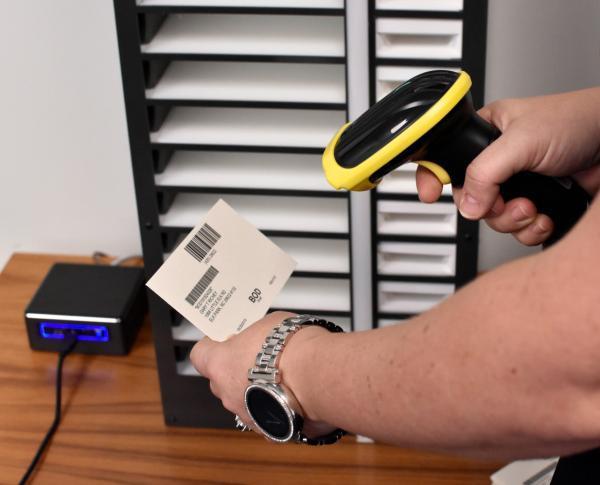
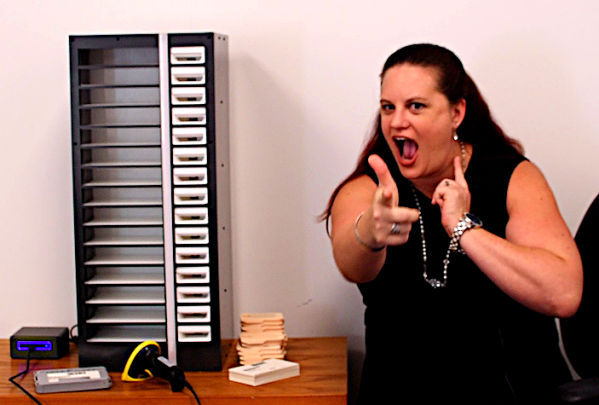
Yes, Katy and I had a few laughs while making the video, but we hope it will provide you the info you need. Below is our Cartridge Recycling with Scribe Promo Video
Cartridge Recycling with Scribe Promo Video on Vimeo
Duplication on Demand Q&A Webinar
Next up, mark your calendars for 2:00 PM Eastern Time on Thursday, September 12 for our next webinar. Katy will be answering your questions about Duplication on Demand.
This will be a live webinar offered via Join.Me. We will record it for later viewing, but also encourage you to think about what questions you have and make plans to join us. Details about how to log in will be posted to the klasusers.com discussion forum a week before the webinar. The recording will be posted on klasusers.com as soon as it is available.
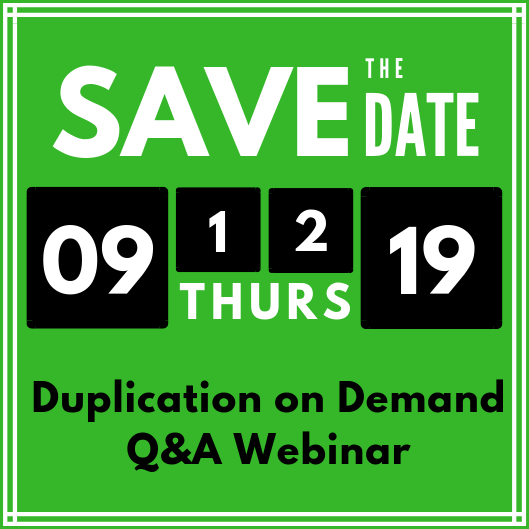
Scribe Announcement!
ExpiredHello, KLAS users! If you were able to join us for the 2019 KLAS Users’ Conference earlier this month, you heard a very exciting announcement from James Burts, Executive Vice President of Keystone Systems, Inc.
Now that we’re back in the office and the Version 7.7 rollout is fully underway, here he is with the news for all NLS Network libraries using KLAS:
We are here to support you, and we fully understand the need to move to a duplication service model. Over the past year, we have put the browser-based KLAS Version 8 on hold to revamp the duplication process, to build in full integration with NLS’ Gutenberg Bespoke device, and to further develop the Scribe appliance debuted at UC2018.
Now, KLAS Version 7.7 is ready for full-fledged duplication service using the hardware of your choice. There has been a lot of excitement for Gutenberg—and understandably so—but NLS’ deployment schedule cannot support getting everyone who wants one of their devices up and running right away. Additionally, we have a lot of confidence in Scribe’s optimized workflow (whether you choose PCC mode, exclusive to Scribe, or Cartridge-recycle mode, now available on either hardware) and other features.
We want to make sure that all of our users who are moving to a duplication service model have the opportunity to implement the hardware that is the best fit for their library, on a schedule that works for them.
To achieve this goal, we have optimized the components used for the Scribe, crunched the numbers, and determined that we can provide one Scribe appliance per KLAS contract at no additional cost.
We pledge to work with you to ensure that you can get up to speed with duplication on the hardware of your choice, whether that means getting you a place in line for a Gutenberg, or getting a Scribe unit heading your way ASAP.
There you have it!
To help you determine whether a Gutenberg Bespoke device or the Scribe appliance is a better fit for you, we will be posting more information about Scribe's cartridge recycle mode and what each hardware option has to offer over the coming weeks. We will also be hosting a duplication-focused Q&A webinar in a few months (date to be announced soon). In the meantime, if you have questions about this exciting news, KLAS version 7.7, or moving to a duplication service model, give us a call or email
For questions about the Gutenberg device itself or NLS’ deployment schedule, please contact NLS directly.
Note: KLAS Version 7.7 for self-hosted Windows Server users should be available in August, and for IRC customers soon. All other users can request a preview database whenever they choose and, once they have gone through the preview checklist, schedule their conversion whenever they are ready. If you have requested a preview database and have not yet gotten your welcome packet and authorization key: keep an eye out! We’re working through the list and we’ll be getting to your library soon!
May Update: 7.7 release timeline
ExpiredI have some great news, and I couldn’t wait until next Tuesday to post it! Our hard-working development team has gotten fixes in place, wrangled the new server, and generally addressed the various issues discussed in the last update.
This means that 7.7 Preview Databases are now available by request to all Keystone-hosted and all Linux-based self-hosted customers!
(Deployment for Windows-based self-hosted customers is still being ironed out; we hope to be able to offer Preview Databases to you soon.)
These demo databases will allow you to spot-check your data and settings to ensure that everything migrated correctly to the new version, train staff, and practice using the new features and duplication workflows. It will also allow us to do some load-testing of the new server to make sure that connection issues don’t crop back up, and that nothing new decides to go sideways on us.
Having a demo database in place also puts you on the fast-track to getting a live version. We will be bringing customers up live one every week or two, starting right away after the KLAS Users’ Conference (and maybe even sooner, if the demo roll-out goes well).
For more information on version 7.7, check out the New Release Webinar! (Note: you must be logged in to KLASusers.com to access that link.)
Future Updates
The wait for 7.7 has been longer than anyone had expected, but once you're upgraded to 7.7, future updates will come along much quicker! Instead of needing a large bundle of updates to be ready all at once, incremental updates will be applied to 7.7 about every two weeks. Fixes and improvements will go out steadily over time, rather than in a large batch after a long wait.
Even better, these updates will occur smoothly and easily, without any need to download and apply an update through your browser. For more information on how updates will work in version 7.7, see the Installation and Upgrades Post.
Duplication on Demand
Our new Duplication on Demand workflows are included in version 7.7, including full Gutenberg integration. NLS is in their final testing phases of this integration, but it is in place, and will continue to be refined and improved.
The Gutenberg device itself will of course come from NLS, and does require custom set-up per customer. We will work with them to fast-track our customers as much as possible, but there is a high demand, and only so many people at NLS who are able to do the set-up and testing needed. At the NLS Western / Southern Regional Conference, they indicated that they expect a pace of about 2 Gutenberg set-ups per month. Who gets one of these devices, and when, is entirely their decision; we can only work with them to get each device’s connection to KLAS in place ASAP.
For those who are considering a Scribe instead, we are pleased to announce that it now supports both the Patron-Centric Cartridge model and the Cartridge Recycling model! We were able to get this in place because the Cartridge Recycling workflow had already been developed to support Gutenberg—we just did a little tweaking and testing to make sure that it worked with the other hardware as well.
Final Thoughts
Thank you all so much for your patience!
We have heard loud and clear that Duplication (and particularly Gutenberg integration) is the priority that the Users’ Group has set for us, and have been hard at work on it since last year. We believe that the results are robust, flexible, reliable, and efficient; everything that we hope you can expect from a Keystone Systems product.
We know that the process has taken much longer than we initially announced, but we think that the final product will be worth the wait. We will continue to do everything we can to get those of you under a time crunch (or who are just eager to get started) up and running on a Duplication on Demand workflow of your choice as soon as possible.
For those libraries not racing to transition to a Duplication workflow, you haven’t been forgotten! With the bulk of the work finished for Duplication, we will be able to integrate improvements that will benefit you as well back into our development cycle.
Here’s the latest Notes from The Scribe for April 2019.
We are now Live on Version 7.7 and into a couple of upgrades.
When we last left you were just on to the Live Version of 7.7. Now we've had some updates and some issues were addressed. We are into at least our 4th iteration of updates and we've been live with full service to patrons since March 18.
First off, I'm happy to report that if you run into an issue it gets corrected pretty fast!!! There are some new tools for more accurate tracking of issues as they occur which allow Keystone to go right in and fix them. It's pretty impressive how fast some things can get resolved. I will tell you that the more detail you can provide, including screenshots, time of day and what you were doing when things happened makes things go much better.
Now onto the patrons and their experience...
From what we've gathered, so far, the patrons we have put on the new service, which we now call Books On Demand or BOD, have been impressed and enjoying the experience. What was once 12 patrons is now nearly 300 patrons as of this writing. We've been averaging adding 6-10 patrons a day. Our strategy has been to put all new patrons on the service, because this is all they will know and there will be no "bad" habits to break.
The other part has been adding transfer-in patrons and anyone who volunteers. Overall it's been a good experience. The other part now is adding existing (non-voluntary) patrons. This first batch of these patrons is a group of around 800 who use advanced digital talking book players (DA1), are not on BARD and have some form of automated (or Nightly) service type. To build a well-running service queue for patrons they have to be on a Nightly service type in order to serve them properly.
One caveat to this smooth running of nightly service types is in the Nightly List Only patrons. These are patrons who wish to be mainly served using their own lists of requests and reserves. The one preference that can also be used is a favorite authors, which should help supplement a list when it's empty. What we ran into initially were new patrons wishing to pick their own books but not offering up a list with anything on it. Also in many cased these patrons didn't give an authors to supplement requests. So this would cause a delay in getting their cartridges out to them while we backtracked or waited to get books. We want patrons, especially when they are new to the service, to be able to experience all of the advantages of this new system. Without any books to offer it will delay our ability to serve them in a timely manner and show them what things look like. As a solution to this issue we developed a curated list of books to offer up to patrons as a kind of sampler so they can see what we can offer them and so they can become familiar with their new digital talking book player and how things like the bookshelf work. This also offers staff a simple means of setting up patrons, as needed. Overall this has helped smooth out some of the initial wrinkles.
On another topic, in the last Notes from The Scribe we talked about tuning the number of books per turn per series takes some time to get adjusted just right. Our tuning of series to pull 2 books from series per turn has worked well. One additional area we needed to adjust was the number of reserves and requests per turn so that more of them will get turned over onto the patron service queue at a time. Along with this, we had some more seasoned patrons that we discovered were getting some newer books from favorite authors, since the system defaults to latest selections first, and they wanted to pull more of the back catalog of these items. So we adjusted the rules to pull oldest works first by Author just to see if this might help. So far so good. Things are working well. One other thing we tried out on 2 of our more particular patrons was setting up nightly auto-selection rules for them specifically and adjusting specific portions of their selections to tune them better and serve them more individually. In these cases, we have been successful in that they are much more satisfied with the individualized attention. This is a nice feature set to use in creating a more personalized experience.
On a final note, I have talked about putting into place good processes. What I would encourage beyond this is to allow these processes to adjust based on the people doing the job. The first part of a good process is seeing the bigger picture, but the second important part is to allow that bigger picture to account for the smaller parts that encompass the task by the people that are doing the task. One of the many benefits I have seen firsthand from this approach is having the people who are impacted the most become champions of the system and step up as teachers and trainers. Watching a process you have laid out being improved is quite satisfying. Seeing all of the things you envisioned at the beginning without being able to see it firsthand, is awesome. A couple of the following recent photos show a bit of staff interacting with the process. The way it looks in these photos is a little bit different than the original vision, but that's just fine.
Here's a couple of recent photos:
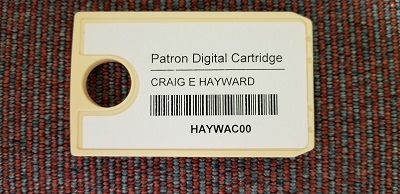
A patron digital cartridge
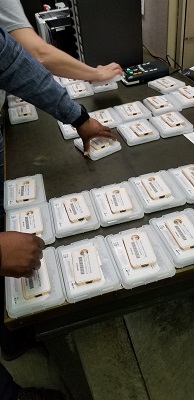
Inspection and inventory of BOD cartridges
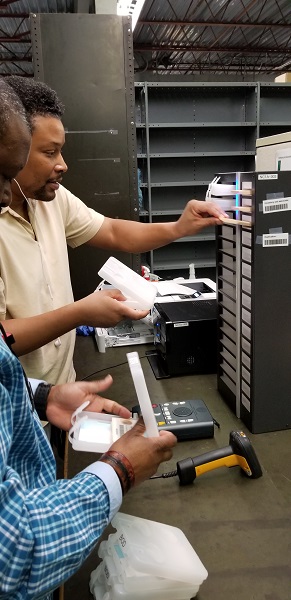
Staff running BOD duplication
That's all for this edition of Notes From The Scribe. The next edition will come out with the next round of major updates and new features.
Here’s the latest Notes from The Scribe for February 2019.
Where we're Live, Live, Live (on version 7.7)!!!
What we've noticed so far, after some initial stability issues on day of launch, is that the connections are much faster now.
This last month we transitioned from playing around with many more cartridge runs, thanks to having all 25 staff on the service now and our 12 pilot patrons are in full service mode now. Feedback, so far, has been mostly positive. We look to start all new patron on Books On Demand Service some time in March.
Staff have test driven the release notes for Version 7.7 and issues have been addressed and corrected. We're in a pretty good place right now.
With the latest update (Version 7.7.2), no more cross assignment of copies, which was an issue we initially had with the system assigning individual books available on the shelves even though someone was setup for duplication service. This doesn't happen anymore.
The service queue and orders tabs work well. They are a good team. One thing we've been able to use them for is some testing to make sure things like the Book announcement file is added and to make sure that the correct number of books are added to the cartridge in the order specified. We are thankful that this is here because prior to this we had to go in by a more back door method to see what's happening.
A recent article by Katy talked about series assignment and duplication service. I will tell you that, since having Nightly now being able to do series assignments as part of the duplication service, there are a couple of things to watch when you initially launch Version 7.7. First off, this way of assigning series books is new and was adapted from another type of Nightly process. We did discover something that will probably be addressed, but something to still check at first. Make sure that in your Nightly Setup you have the check box for Has Hads checked off. Otherwise, as we found out with our pilot patrons, they will probably be issued books they've had in a series before. Check the box and this goes away.
Secondly, tuning the number of books per turn per series takes some time to get adjusted just right. We currently have chosen to make 2 turns per run on Series. This allows for 2 books per series to be run per service queue. We do have one or two patrons that will be binge people. For these you can go in to Nightly and adjust on a per patron basis just this rule. Which is pretty cool when you put it into practice.
On a final note, I will say that you want to make sure you put good processes in place before you start using this system on a wider scale. Seeing how things will fit together and such is a good chance to update and take a closer look at how you serve patrons across your service. In our case we have a nice set of processes that we can look at for reference. The library's books on demand committee will be meeting again soon to talk about our steps of putting all new patrons on the service and moving forward with adding existing patrons. One area that looks good for this is our ILL patrons. I'm actually going through a list right now.
That's all for this edition of Notes From The Scribe. The next edition will come out with the next round of major updates and new features.
Order up!
ExpiredI have another 7.7 preview for you today!
As part of our continuing efforts to support the high-volume duplication service model, we have been working on another new tab for the Patron Module: the Orders tab.
Right now, both the cartridge itself and each of the titles loaded on it are listed individually on the Items tab, and it can be difficult to tell which titles were on which cartridge, or to tell which were pre-existing cartridges vs which were duplicated for the patron. Well, in KLAS version 7.7 and onwards, they will continue to be listed there, allowing you to continue using the tab you are already familiar with to quickly check whether a patron has had a certain title, what was the last thing sent, and so on.
However, when you need more detailed information or to see which titles were on which cartridge... now, you'll have the Orders tab.
For right now, this is a Read-Only tab, meaning that nothing can be changed or modified from this screen. However, you will be able to browse each duplication order sent to that patron in the top browse, and view all of the Titles from a specific order (and only the Titles from that order) in the bottom browse.
Using this tab, you'll be able to easily answer patron questions like "I accidentally sent the wrong one back! What was on the last cartridge you sent me?" or "Oh, what was that book I read right after the new Nora Roberts? It was the last one on the cartridge and I forgot to write the name down..." and even "Why did you send me that awful book?"
Here's a preview of what it looks like right now:
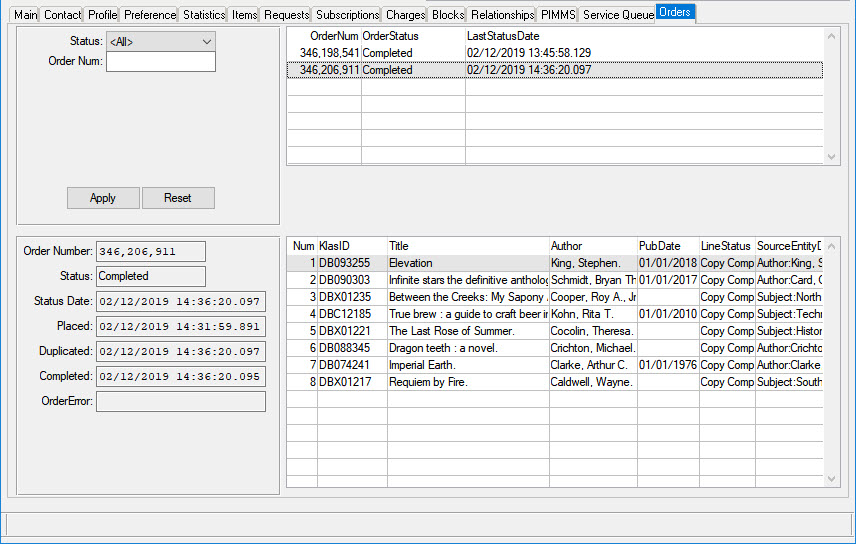
And there's more! While we think this will be a useful starting point, we have more development planned for the Orders tab, including:
More filtering options - such as Circ Status (Assigned, Out, Returned), date sent, and date returned
Functions - such as resend order (great for those "I didn't mean to send that one back!" patrons)
So what do you think? Is there something you'd like to find on this tab that isn't there yet? Any functions you want us to build in? Let us know!
Series and Duplication Service
ExpiredThe addition of the Service Queue and the transition to duplication service is a huge change to patron services. One thing that it will likely have a big impact on is how we serve Series.
In the new service model, Nightly Duplication functions are used to refill the Service Queue, similar to how Nightly Autoselect works now. Duplication Orders are constructed from this Queue (by pulling Titles in order from the top of the Queue) for use with the old PCC Cartridge Builder program, the Scribe unit, or Gutenberg Bespoke.
One of these functions is dedicated to serving Series. Like all nightly functions, the function is constrained by the nightly setup parameters. There are separate functions for the "old" nightly (termed Physical delivery method in the new setup), and the new Duplication delivery method, used for populating the Service Queue.
Read on or download the attached file for the details of how the Duplication - Series nightly function will work!
Duplication – Series Nightly Function
The Duplication - Series function checks the patron's Series Preferences and applies exclusions as specified in the function setup, and then starts adding the books to the Service Queue in series order until either:
- It reaches the end of that particular series list, or
- It reaches the Max Per Function specified in the function setup.
It is expected that the library-wide Max Per Function for the Duplication - Series function will be set high enough to allow most series to be added in full to the Queue, but low enough to keep lengthy series from completely dominating the queue. However, you can take whatever approach you think will best serve the majority of your patrons.
Determining the best Max Per Function for your library will likely take some trial and error; you can adjust it as needed until you find the right fit.
What about hard-to-serve patrons?
For patrons that strongly prefer to continue receiving their series one book at a time, or who want a whole series in a row no matter how long it is, a patron-specific Max Per Function can be specified. You will be able to set that patron’s Max Per Function to meet their specific needs without affecting service to your other patrons.
Note: As part of our adjustments to Nightly to allow Duplication service, you no longer have to specify every function for a patron if you only want to override one or two. You only need to create a patron-specific function for the ones to override. Other functions will still serve that patron using the library-wide settings.
What if a Series Preference has multiple Media types?
Prior to Version 7.7, KLAS has been able to serve a series in multiple Media. This was particularly helpful during the cassette to digital transition, when parts of a series may have been available on RC while later additions were in DB.
It was also possible to serve a series in both DB and BR based on which version is available when the prior book is returned—however, this approach is only possible when the different versions are equivalent. The increase in anthology cartridges from NLS (i.e. books 1-3 in a single DB) make this less and less viable.
Moreover, in the duplication service model it is expected that all titles in a series will always be available for duplication. Though there may be exceptions (titles that were never made available on BARD, but which may be acquired in other formats), they should be rare.
Our decision was to restrict series to either duplication or physical circulation—not both.
This will not require you to remove the other Media from existing Series Preferences or to add a new one!
When KLAS serves a series, it will now check to see if any of the Media listed have an associated Service Queue. This happens when the series is first created, when a previous title is checked in, or when a series is restarted.
Example: If a patron has a Series Preference for Patterson’s Alex Cross series in RC or DB media, KLAS will check to see if the patron has a Service Queue. When it finds a DB Service Queue, it will serve the series using the Duplication – Series function instead of physical circulation.
What will happen if I restart a series?
The Restart Series function will now clear the Has-Hads for all titles in the series but not take any other action. In other words, that series will be eligible to be added back into the Service Queue the next time it refills, but it will not be added to the Queue immediately.
This allows you several options:
- Letting the series go back into the Queue after the other titles already on the queue have been sent.
- Using the Fill button on the Service Queue tab to manually refill the Queue right away (according to the rules and maximums set up in Nightly Processing and on the patron’s Profile tab).
- Removing less wanted Titles from the Queue before refilling it, potentially allowing more of the series to be selected right away.
- Manually add a few Titles from the series to the Service Queue, bypassing the Patron’s reserves and requests if your Nightly usually checks for those before checking series.
Final note
As a reminder, while KLAS 7.7 is nearly complete, changes are still being made in response to field testing with the Scribe and internal testing with the Gutenberg.
As we gain experience with the duplication service model, everything is subject to further adjustment, refinement, and re-evaluation to serve you better.
Download this article
DOCX - Duplication Service - Series
PDF - Duplication Service - Series
Hi all,
Here’s the Notes from The Scribe for January 2019.
This last month we played around testing out the limits of the system with many more cartridge runs, thanks to having all 25 staff on the service now. This means we can go much more fully into things and do larger groups of testing. The library’s Duplication on Demand Committee met again so we could prepare to roll out the service for a pilot patron group before everything goes live.
The first big news, is that we have now put 12 patrons on the service who are piloting the service. We had mentioned starting them in Mid-December, but some adjustments had to be made to the system first. This week we'll pair them up with cartridges and set them loose. We'll get feedback and tune things for putting more patrons on this service this early spring. At that time we will begin offering this service to all new patrons and pull from a list of more existing patrons to add to the service. This will grow over time. Currently it stands at 3000 or so.
The other big news is that we're about to get Version 7.7 running live in our library. If any of you attended Katy's webinar on version 7.7 you know that contains a great many improvements and features. We have been treated to experiencing a bunch of these things by being able to test out this new version for use with The Scribe. One notable piece is a button in the patron book search results to add items directly to the Service Queue. The roll-out should happen some time in the next week or so. One noted strength of being a tester of the new software version is our staff's ability to check things out and test some things before we go live. Staff currently is taking release notes for this new version and double-checking things before we go live just to make sure when we flip the switch we'll be good to go. We have learned from past updates that sometimes things do get "broken" in the process of updating things. So this kind of feedback is valuable and helpful, in case something needs to still be adjusted before we go live. It also will help prepare staff for the overall transition in service. As we say around here "this is getting real".
Here are some photos of this month's testing of more cartridges (patron orders) at the same time on a larger scale. The results are promising
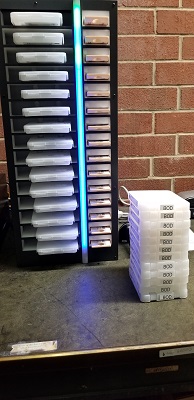
That's all for this edition of Notes From The Scribe. The next edition will come out with the next round of updates and new features.
Hi all,
Here’s the Notes from The Scribe for November 2018.
This will be a shorter version. This month we played around testing some limits of the system itself and some improvements to our own processes as we get ready to roll out this service in full. The library’s Duplication on Demand Committee has met twice and we are shaping how our service will work moving forward with this exciting offering. Let’s go over some brief highlights since I last updated you all.
In November we finally put all staff on to the service as a test group so that we could run larger batches of duplication jobs. What we discovered with this process is that The Scribe is up to the task (so far). The speed of duplication whether you are copying one cartridge or 12 doesn’t really change much. In our sample, one cartridge typically takes 3.5 minutes to put 5 books on one cartridge and 4.5 minutes to put 5 books onto 12 cartridges at the same time, in 2 different locations. I say 12 because that’s all the staff we had up on the system at the time we started the tests. We still need to run the remaining cards for the rest of staff (13 more people) and put together cartridge sets. Once we have that we will look at 15 at a time. We do note that there seems to be a kind of sleep mode from starting out the day running this. There is a little delay when you start up first thing and put everything in motion, which isn’t as pronounced the rest of the time. As we go forward and the units run more throughout the day we will see how this pans out. But if you want to run 12 cartridges (patron orders) at the same time, this device does that well.
The next phase will be to run all cartridge slots on both units at the same time. This should happen in the next week or so once we get all staff setup.
Another thing of major note, the committee decided that rather than calling the service Patron-Centric Cartridge or PCC service, we have adopted the name Books on Demand or BOD. The group decided that this would be easier for the patrons to understand. The term Patron-Centric Cartridge is meaningless from a patron standpoint. The method behind how those books (and magazines) are served doesn’t matter to the patron. While this is a PCC type of Duplication on Demand Service we will refer to it as Books on Demand or BOD for simplicity. Also this leaves open the option of using other types of delivery for patron reading materials.
One final note, a group of 15-20 patrons will begin pilot testing the system in mid-December. We have worked out most of the kinks in the system, but the next step is patron feedback that we’ll get so we can fine tune some things. The hope is to move beyond the pilot by mid-January and roll things forward. We think we’re on target for that to happen. As we say around here "this is getting real".
Here are some photos of this month's testing of more cartridges (patron orders) at the same time on a larger scale.
As cartridges are inserted The Scribe recognizes them each and, if all is well the light turns blue to indicate that the cartridge is seen and ready
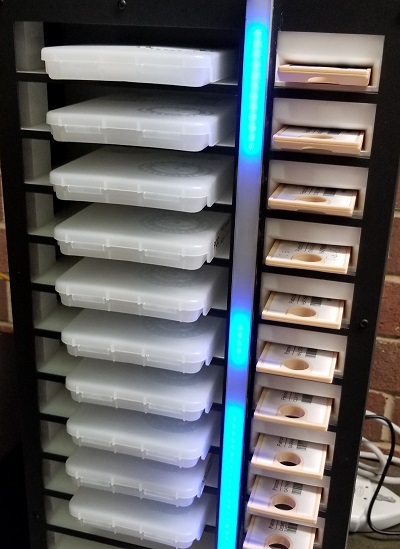
All is working well. Cartridge slots filled with cartridges and all are blue indicating that the duplication process is beginning
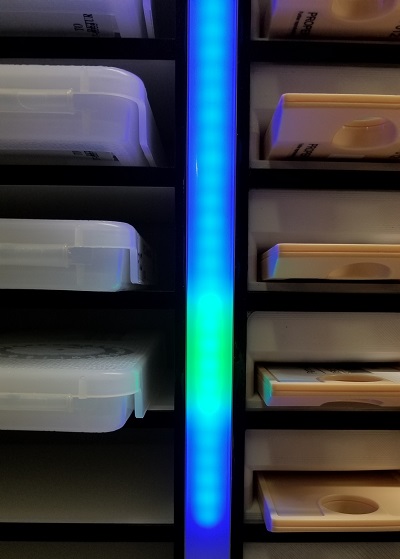
When a patron duplication job completes, and the cartridge is checked out, the light goes to green that tell you to pull it and send it out in the mail
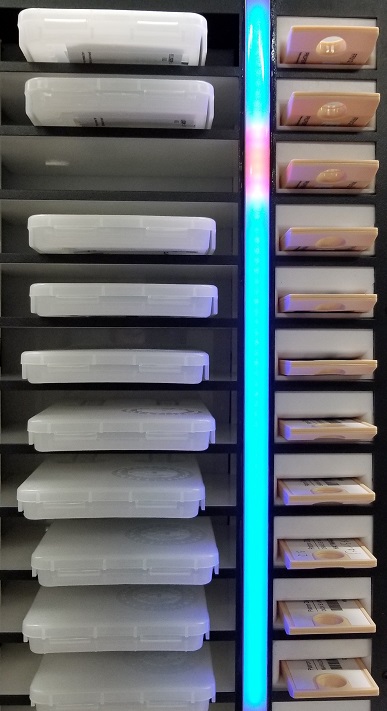
When a red light comes on it means there’s an issue with the cartridge or the patron account. These red cartridges get pulled and put to the side with the case (not shown) to be dealt with after the run. In this case there weren’t actually any books added to this new patrons service queue by staff.
That's all for this edition of Notes From The Scribe. The next edition will come out with the next round of updates and new features.
What We’re Working On
ExpiredHello, KLASusers! As we start looking towards the Holidays, I thought this might be a good time to check in with the developers and let you all know where we stand with the big projects that we know you all have on your Christmas Wishlists.
KLAS 7.7 is coming!
I know we’ve been talking about this one for a while now. This is a huge update that impacts every part of KLAS, so getting all the last pieces and touch-ups and testing in place has been a big project for us. Additionally, as hosted customers are upgraded to version 7.7, they will be migrated to our new server.
It’s important to keep our hosting stable, speedy, and secure for you, so we put a lot of work into getting the new server ready for you. It’ll be faster, more secure than ever, and uses a new method for rapid recovery to a backup server in case of failure.
I will be hosting a webinar to take a closer look at 7.7 later this month, but some of the improvements will include:
- Structural, back-end changes. While these won’t be visible to you at all, we expect them to improve performance and free up some system resources.
- UTF-8 support. This essentially extends KLAS’ character set, allowing for better handling of diacritics and other “special characters.”
New installer. This will usually remove the need for admin access to install or update, make installation and updates easier, and enhance security. It’s a win-win-win! - A new method of connecting to the database server. We are implementing PASOE, which will eliminate the need for OpenVPN and reduce or eliminate lost connections due to network drops.
- APH Census improvements. More back-end changes, this time to how and where APH data is stored. These standardizations will improve our ability to support various options for keeping up with the annual APH Census and ensure accurate, reliable reporting.
- SCRIBE! High-capacity PCC duplication using Scribe will be fully-functional. This will include the brand-new Service Queue Tab, the ability to include firmware updates and newsletters on all duplicated cartridges, and other upgrades to ensure a flexible and sustainable workflow.
This update will go Live for a limited release in January.
We need this to be a limited release because of the new server and the sweeping back-end changes. In the (unlikely, but possible) event that something goes sideways, it’ll be better for everyone if we can fix a few databases and get the others right from the start, instead of needing to scramble to get a fix in fast for everyone.
We expect to open the doors for everyone in February.
What about Gutenberg?
Don’t worry—this hasn’t fallen by the wayside. As announced this summer, we’re building on our work for Scribe to integrate with NLS’ Gutenberg as well. In fact, we’re nearly finished!
Gutenberg support will be included in the next update after 7.7, and the rollout should follow close behind the main release.
While we’re making good use of North Carolina’s robust testing of our new systems and workflows, we’ll need some extended testing on Gutenberg specifically. We know a lot of you are eager to get on this as quickly as possible, but we also don’t want to set you up on something that doesn’t quite work. We’re balancing speed and prudence, and expect to put this out on limited release in February.
Future Updates?
With the big structural changes and server swap all taken care of, we expect our release schedule to pick back up following the 7.7 release. We have a lot of updates and improvements on our to-do lists, and are eager to get them out to you.
If you have requests for anything to add to our list, or want to make sure we prioritize something you’ve been waiting on, please add it to the KLAS Development Suggestions forum! Posting there will ensure that your suggestion or request is seen by the KLAS Development Advisory Committee (KDAC), who will help us evaluate how valuable it would be to other Users. It also ensures that we have a written record of what people are interested in, which can easily be referred back to or passed among the developers.
We can’t wait to start 2019 off right with some fantastic new features! Thank you all for your continued support, and Happy Holidays from all of us here at Keystone!
Hi all,
Here’s the Notes from The Scribe for October 2018.
A couple of cool new features and some improvements to our own processes have happened since September. Let’s go over some brief highlights since I last updated you all.
October saw the Inventory and Associate (IA) mode added. In this mode, you can add a cartridge to inventory and pair it with a patron at the same time. Meaning less worry about keeping an inventory available and also not having to tie up a staff member and their own computer while making cartridges available. To do this, you scan one barcode that puts The Scribe into Inventory and Associate mode. Then you take a batch of mail cards and cartridge labels printed out for each new patron added to this type of service and you pair them each to their own cartridges. When finished you scan another barcode, which puts The Scribe back into Duplication mode, and you’re now ready to duplicate items onto these cartridges.
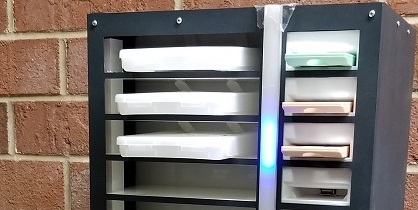
In conjunction with this process, the set up for the patron process for setting them up on this service was refined, so that before the actual mail card and label set was run for a patron cartridge, a set of books is already waiting to be duplicated. All fine adjustment of what the patron will receive on their first run is worked out first. This way, when staff puts The Scribe into Duplication mode things will run smoothly and the patron’s first books will be on their way right then.
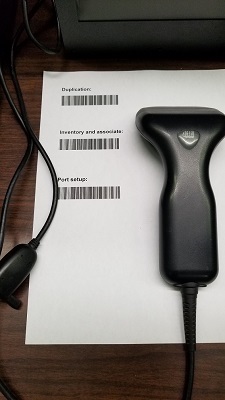
Related to this is another cool feature. You may have noticed that The Scribe doesn’t have a monitor attached to view anything happens while it’s running. As it turns out there is a monitor app that you can use to see the status of the cartridge slots and see what’s actually happening at each slot. This is a quick screen grab to give you an idea of what this looks like. This isn’t necessarily the final version, but it’s very useful even as is.
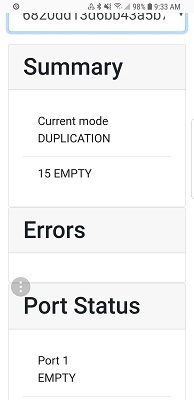
Another feature that was added, that many of you have now heard about, is the Service Queue tab in the Patron Module. This makes adding items to be duplicated on cartridge more efficient and easier. A very useful feature. Since we are fortunate to be the first users (the Guinea Pigs) we have been able to try it out, test it, and provide feedback for improvements. Some of which will be seen as things evolve into the system that will go live in the near future. For specific information about this exciting new feature, check out Drea Callicutt's article - KLAS Service Queue Sneak Peak.
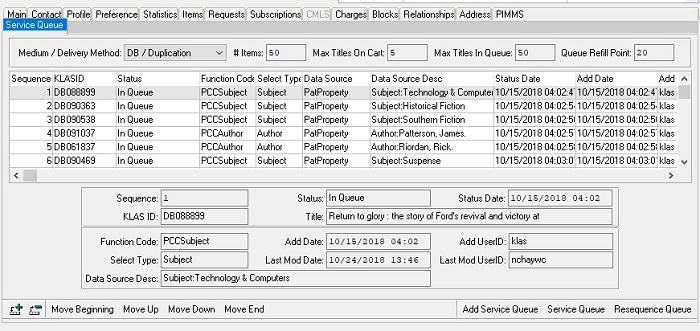
As a result of these enhancements, more processes were refined to match the workflow of our library and we held some more detailed staff training using these tools. Staff working together to put each other on the service so that we can all use the service ourselves and get a feel for what it will be like for patrons once we go live. This also gives us a chance to practice things in a more practical way.
We have had questions about from other about whether actual patrons are using this service yet. We are considering taking 5 to 10 willing patrons and letting them try out the service before we go live. The only downside to this will be having to import whatever hashads for books received during this time into the live database to keep our statistics accurate and to present issues to patrons once we move to the new live version. This is why we would only do this with a rough handful of patrons.
In any case, we are excited to move forward. That's all for this edition of Notes From The Scribe. The next edition will come out with the next round of updates and new features.
Gutenberg is Coming!
ExpiredFor this week's Key Note, I wanted to highlight a reply that James Burts recently posted to the forums--it's exciting news and we don't want you to miss it!
"We will be adding support for Gutenberg from KLAS. Time will tell if Scribe has any purpose beyond being a valuable testbed for our duplication efforts, but we have certainly heard loud and clear that you all want us to integrate KLAS with Gutenberg.
However, in order to be able to do this, there are some foundational parts that must be in place first. The biggest and most important of them is what we are calling the "Duplication Queue". The Duplication Queue is just what the name implies-- a prioritized list of titles to be duplicated to cartridges. We are adding to the nightly routines to make sure every patron's Duplication Queue is automatically filled with books that the patron would want. This automatic selection will function with similar rules as the current nightly auto-select to allow KLAS to pick books to be added to the duplication queue, but with a few very important differences from what nightly currently does.
- The duplication queue will be books that the system has selected in advance.
-
- The system re-fills the queue the night after a patron receives a duplicated cartridge.
- Once titles are on a patron's duplication queue, entries can be added, re-prioritized, or deleted whenever you want. This will allow the RA's (or the patron themselves) to modify the items queue as they want--- like you can adjust the items in your NetFlix wishlist.
- The selection of items in the duplication queue will be based on the full BARD collection, not just the titles you have available in inventory (which is how the current nightly programs operate).
-
- We are basically needing to create a process very similar to our nightly selection routines, but with some significant differences. The two processes are having to be somewhat aware of each other, and make sure they don't step on each other's toes. (for a simple example, if a patron returns a cartridge and is now due for service, we don't want both systems sending both a book from inventory/turnaround as well as a cartridge from Duplication on Demand.) Weaving these systems around each other is the cause of much of the difficulty in the Duplication Queue.
Having the automated selection of books for the duplication queue is a huge step. It takes away the current need to manually click the "Serve Patron" button, and pick the books that will be written to a cartridge. Having a manual step to select books would severely hamper the ability for Duplication on Demand to scale to support a collection-free workflow."
We want to make sure that KLAS' Gutenberg integration doesn't just work, but works well. That means a smooth workflow for selecting titles and duplicating the cartridges, and it also means tracking what actually happened at each step along the way. As part of our integrating with Gutenberg, we will be making sure that enough information is recorded to be able to track down issues, troubleshoot bugs, and answer patrons' questions, such as "Why didn't I get this title?" and "What was on that cartridge?"
The developers are hard at work, and we expect that the Duplication Queue should be finished in late September / October. Then they will work on tying that piece into the Gutenberg itself, which could take another couple of months. The current estimate is that they should be done sometime in December / January.
We expect to deliver a robust process that will work with Gutenberg (or other hardware) to provide your patrons with the right titles at the right time--with the right amount of work needed to run it.
In the meantime, please continue to contact us with your questions, workflow preferences, and suggestions!
Many KLAS libraries are already wrestling with (or soon will be) the challenges of reduced space to house their collections and / or less circulation and support staff. With these issues and other in mind, we designed KLAS' Patron Centric Cartridge functionality to provide library staff with the ability to quickly select and reproduce a specific set of books onto a cartridge for a specific patron.
While this works well for many libraries, we know this is not the best option for ALL organizations.
In our discussions at Keystone, we have identified at least three different duplication on-demand workflow scenarios including two patron-centric and one title-centric:
- A single cartridge tied to a single patron which is reloaded with books for that patron each time it is returned.
- Cartridges that are loaded with titles based on a single patron's preferences but are not tied to one in particular. Rather, whichever cartridge is available at the time is loaded with the patron's books.
- Cartridges loaded according to inventory (Examples: The Harry Potter Series, Nonfiction titles added in the last 30 days, 1 year of Southern Living)
Some questions we have as we prepare to move forward with providing additional duplication-on-demand functionality within KLAS are:
- Do any of these options appeal to your organization and how it operates more than another?
- What considerations do you think need to be made for each?
- What specific challenges and / or benefits do you think you may see from operating under each?
Please share your answers / thoughts / feedback on the "Duplication on Demand: What works best for you?" klausers.com discussion forum thread.


